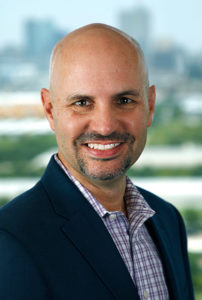New smartphone app provides real-time alcohol recovery support to homeless adults
 A new smartphone application is helping residents of a Dallas homeless shelter combat problem drinking through an innovative program that uses machine learning to predict the feelings, triggers and situations that can lead to alcohol misuse.
A new smartphone application is helping residents of a Dallas homeless shelter combat problem drinking through an innovative program that uses machine learning to predict the feelings, triggers and situations that can lead to alcohol misuse.
Scott Walters, PhD, Regents Professor at The University of North Texas Health Science Center at Fort Worth (HSC), leads the study on this health intervention and recently published in the Journal of Substance Abuse Treatment.
Dr. Walters and a team of researchers are partnering with The Bridge Homeless Recovery Center in Dallas, where residents are provided smartphones to better understand and predict when, where and why they may be more apt to drink and to aid in their journey toward recovery.
“The program begins as these individuals interact with the phone app, responding to surveys at different times throughout the day for several weeks, to gather data on their location, who they are with, their mood, and what’s happening in the moment that could influence them to drink,” Dr. Walters said.
“Much like Amazon Prime or Netflix give suggestions tailored to the individual, this program uses algorithms to evaluate a person’s risk factors and predict – within the next 4 hours, with over 80% accuracy – when that person is likely to drink.”
The app features more than 800 potential messages based on the time of day and the person’s mood, cravings, location, and motivation at that moment.
“For example, if the program predicts a person is about to drink because alcohol is nearby, a pop-up message might encourage them to practice refusal skills, engage in mindful breathing or other awareness techniques, or move to a different location,” Dr. Walters said.
“The content of the message is unique to the particular risk the person is experiencing at that moment.”
In addition to suggestions from the app, individuals also have access to videos and online resources.
The National Institutes of Health (NIH) reports that alcohol problems are prevalent among people experiencing homelessness, with rates of drinking that can be up to eight times higher than for other groups. The stresses of living on the street or in shelters can be complicated by other life factors as well, impacting not just a person’s reasons for drinking but also success in recovery.
“Treatment provided in homeless shelters can be very effective,” Dr. Walters said, “but people move on or may have complicating mental health needs or other issues, so completion rates tend to be poor. Only around 15% of people who start a substance abuse treatment program finish it.”
This new program is in its final phase – where the messaging effectiveness is being tested. Dr. Walters said the hope is that this application can serve other homeless populations. This would help them maintain their treatment plans by interrupting the urge to drink.
David Woody, III, PhD, President and CEO of The Bridge, noted that this research and the app provide a “unique communication channel and ongoing assessment that is important to the homeless recovery model, supporting individuals’ resiliency and ultimately their pilgrimage toward recovery.”
Working with Dr. Walters on this application are Professor Eun-Young Mun, PhD, and postdoctoral research fellow Xiaoyin Li from HSC, and faculty researchers from the University of Oklahoma Health Sciences Center and The University of Texas Health Science Center.


![Uyen Sa Nguyen Scaled[58]](https://www.unthsc.edu/newsroom/wp-content/uploads/sites/16/Uyen-Sa-Nguyen-scaled58-145x175.jpg)


Social media